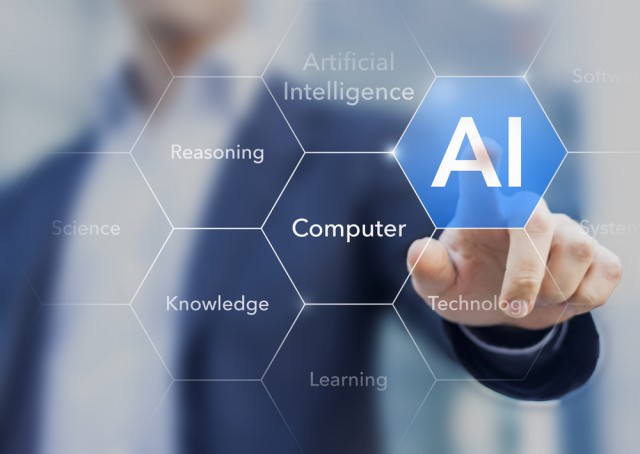5 ways artificial intelligence is changing the future of work | BetaNews
5 ways artificial intelligence is changing the future of work
January 9, 2018 • By Erick Tai

The proliferation of artificial intelligence (AI) is changing everything about the way we live, shop and communicate. From Amazon's incredibly helpful recommendation engine, and Target's startlingly accurate pregnancy predictor, to the diagnosis and prediction of medical conditions, we've become simultaneously slightly creeped out, yet also somewhat dependent, on AI.
In some cases, it's become so seamlessly woven into our daily lives that we hardly even notice. For example, Apple's QuickType keyboard, which suggests the next word based on the context of your message, is an AI technology that many of us rely on every day without even realizing it.
These are all fine and good, mostly because they make our lives easier and more comfortable. But, when it comes to considering AI's impact on our jobs, people are concerned. According to a Pew Research survey, more than 72 percent of Americans worry that AI technology will take over their job and fear that it might make them obsolete.
Fortunately, the evidence indicates otherwise. According to Gartner Inc., AI will create more opportunities — some 2 million net-new jobs — by the year 2025. In the same way the computer software industry changed the way we work in the late 80s and early 90s, making us more efficient and productive and creating a new, billion-dollar industry, AI will have a similar effect, generate $2.9 trillion in business value and helping us to recover more than 6 billion hours of productivity.
Instead of rendering humans not as important in the workplace, AI will actually make us more capable and useful, with automated solutions freeing up more of our time and talent for higher-value thinking and problem solving, strategizing and creating innovative solutions.
So, how will the workplace of the future look as AI makes further inroads? We're already seeing some changes starting to take hold, and here's a glimpse into what we can anticipate.
- AI will improve decision-making. While some may fear that AI will supplant human intelligence and intuition when it comes to making important decisions, the reality is that it will instead enable us to make better, smarter and faster business decisions. By combining the ability to analyze massive amounts of data with AI and then apply human knowledge, creativity, and understanding to make the right choice — a combination Gartner calls the "centaur model" — providing decision support will become AI's greatest value. We won't have to rely on educated guesses, intuition and gut-feeling; we'll have significantly more compute power and data-driven insights to make more calculated, well-informed decisions on the fly.
- Recruiting, hiring and retention will change. As AI-oriented tools for human capital and performance management become commonplace, companies will be able to recruit, hire, and develop people based more on talent, value and skills rather than attributes like years of experience or level of education. HR teams will be able to focus on matching people to the right roles more accurately given their behavioral attributes, strategic talent and performance experiences, leaving transactional tasks like job descriptions, emailing candidates and predicting attrition and demand to tools supported by AI. This will also help our workplaces to become more inclusive and diverse by moving past traditional assessments that ignore hidden, yet crucial data like lexicon and language analysis, behavioral patterns and promotion data. With AI algorithms, we can uncover areas of weakness where inequality exists in hiring, promotion and review time through predictions based on historical data.
- We'll transition to continuous learning. In most workplaces, training is episodic—annual compliance training, periodic skills training, occasional continuing education programs. But, by using AI to help analyze the current status, role, behavior, satisfaction, engagement and sentiment of each employee, companies will be able to deliver just-right training and skills development opportunities to employees at the right time to support career path planning and retention. This will not only give employees enhanced or new skills they need to improve their performance when they want it, but will also help to reduce disengagement and turnover, which directly impacts sustainable revenue growth.
- Work will become a social science lab. As AI gives us the ability to analyze and understand things like employee behavior, sentiment, engagement and culture, it also gives companies the ability to course-correct real-time in order to optimize those attributes. For example, organizational network analysis tools can now capture metadata from emails, feedback platforms and other sources to analyze communication patterns, workflows, bottlenecks and even identify internal experts and/or mentors based on tone, context and other cues. This helps organizations take a pulse on satisfaction, engagement, and trust networks and identify patterns of successful career mobility and how individuals fit into that framework.
- We'll have to hire for AI. In much the same way that the computerization of the workplace gave birth to millions of new jobs in IT and related business functions, AI will bring forth its own new classification of jobs across teams. As the technology permeates every business unit, from marketing and sales to manufacturing and accounting, it's growth will stimulate the creation of millions of new highly-skilled, well-paying positions across every industry. This will put the onus on HR to identify the skills, attributes and talent growth strategies necessary to fill and retain AI-oriented roles, while remaining in sync with corporate values and strategy.
As we prepare for a future dominated by technologies including AI and machine learning, organizations of all sizes and in every industry must continue to invest in tools and solutions that give them the power to innovate and maintain sustainable growth in a highly-disruptive environment. Remaining competitive in the era of digital business will depend on the ability to be nimble and continuously improve in critical areas to optimize performance and continuously create value for customers.
Photo Credit: NicoElNino/Shutterstock
 Erick Tai is co-founder and VP of Engineering at Reflektive, overseeing the real-time performance management platform's development, innovation, expansion and feature delivery. With deep expertise in software engineering, front-end development and product lifecycle management, Tai is a hands-on leader who excels at inspiring his team in both strategy and execution.
Erick Tai is co-founder and VP of Engineering at Reflektive, overseeing the real-time performance management platform's development, innovation, expansion and feature delivery. With deep expertise in software engineering, front-end development and product lifecycle management, Tai is a hands-on leader who excels at inspiring his team in both strategy and execution.